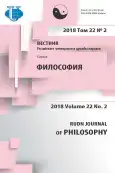To the Question of Strategies in Humanities (A Case Study of the Russian Latin American Studies). Part II
- Authors: Bondar OY.1
-
Affiliations:
- Peoples’ Friendship University of Russia (RUDN University)
- Issue: Vol 22, No 2 (2018)
- Pages: 197-205
- Section: SOCIAL PHILOSOPHY
- URL: https://journal-vniispk.ru/2313-2302/article/view/344836
- DOI: https://doi.org/10.22363/2313-2302-2018-22-2-197-205
- ID: 344836
Cite item
Full Text
Abstract
The author of the article discusses the key for the Russian Latin American studies concept of cultural synthesis. The author sets the questions of determining the semantic field of the very concept of “cultural synthesis”, of the possibility or impossibility of (culture) generating (a type of) interaction and its boundaries in the case of (historically) diverse cultural traditions encountered in the lands of the New World. The author reveals the different levels of the solution to the problem, offered by the Russian Latin American studies. The criticism of a “pre-theoretical” setting is offered, genetically related to the attempts of the continental cultural and philosophical reflection to comprehend the phenomenon of the miscegenative culture. The interpretative models are revealed, that arose in the Russian cultural and socio-cultural systematical analysis, in which occurs the rejection of a one-dimensional socio-historical explanatory schemes, and is offered a rethinking and reassessment of the general theoretical and historical approaches, which will allow to identify and represent the process of the cultural genesis in Latin America in its original imbalance, non-linearity and abnormality. The author brings to light theoretical and methodological resources of the civilizational discourse, discussing the possibility of their application to the analysis of the said problem. Special attention is paid to the typological features of classical objects, formed “monoliths”, and becoming of non-classical borderline formations. In the framework of the borderline civilizations concept, the author introduces the vectors of the search for the problem’s solution, set by the ontological (static) and historical (dynamic) approaches.
About the authors
O Yu Bondar
Peoples’ Friendship University of Russia (RUDN University)
Author for correspondence.
Email: bondar_oyu@rudn.university
-
Miklukho-Maklaya Str., 6 Moscow, Russian Federation, 117198References
- Vorobieva OV. History and Theory of Civilizations: in Search of New Prospects: Instead of the Foreword. Civilization as an Idea and Research Practice. Civilizations. V. 9. М.: Nauka, 2014. P. 5—26. (In Russ).
- Zemskov VB. Introduction. The Literary Process in Latin America. ХХ Century end Theoretical results. The History of Latin American Literatures. ХХ Century: 1920s—1990s. Vol. 4. Part 1. M.: IMLI RAN, 2004. (In Russ).
- Zemskov VB. Latin America and Russia. The Problem of Cultural Synthesis in Borderline Civilization. Social Studies and Modernity. 2000. № 5. Р. 96—103. (In Russ).
- Zemskov VB. From the Study of the Literary Process to Understanding the Civilizational Paradigm. Latin American Culture in the Discussions of the 20th — early 21st century. M.: IMLI RAN, 2009. С. 360—392. (In Russ).
- Zemskov VB. Civilizational and Cultural Borderland — Universal Constant and Means of Self-Creation of the Global Historical-Cultural Process. Problems of Cultural Borderlands. In Memoriam V.B. Zemskov (1940—2012). M.: IMLI RAN, 2014. Р. 13—21. (In Russ).
- Ionov IN. Evolution of Civilizational Representations. The Journal of Education and Science “ISTORIYA” (“History”). 2013. Vol. 4. Issue 2 (18). (In Russ).
- Kofman AF. In Memoriam V.B. Zemskov. Problems of Cultural Borderlands. In Memoriam V.B. Zemskov (1940—2012). M.: IMLI RAN, 2014. P. 6—8. (In Russ).
- Latin American Civilizational Unity in the Globalizing World. In 2 Vols. Vol. 1. Resp. Editors E.V. Rashkovskiy, V.B. Кhoros. M.: IMEMO, 2007. 106 р. (In Russ).
- Shemyakin YG. Latin American Civilization and Latin American Literature. In: Latin American Culture in the Discussions of the 20th — early 21st century. Moscow: IMLI RAN; 2009. p. 445—461. (In Russ.)
- Shemyakin YG. Peculiarities of the “Borderline Civilizations”: Latin America and Russia in Historical Comparative Light // Social Studies and Modernity. 2000. № 3. Р. 96—114. (In Russ).
- Shemyakin YG. At the Origins of the Cultural Synthesis Process: The Interaction of Spanish and Indian Worlds in the Age of Discovery and Conquest of America. In: America after Columbus: the Interaction between two Worlds. The Problems of Indian Studies. Moscow: Nauka; 1992. p. 103—112. (In Russ.)
- Yakovenko IG. The Problem of the Scientific Method in Civilizational Studies. Civilizational Studies. Resp. Editor B.I. Koval. M.: ILA RAN, 1996. (In Russ).
Supplementary files









